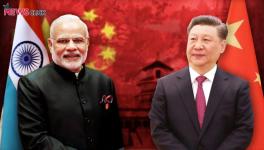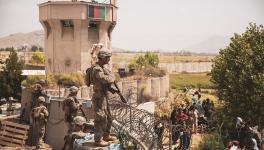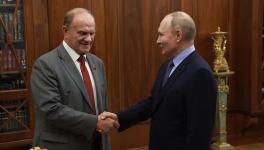US Pips Regional States at Race for Kabul
In a hugely consequential advisory, the US Treasury Department quietly signalled on Wednesday that it was “tweaking” the sanctions against the Haqqani Network. The international banks can transfer money to Taliban, including Haqqani Network without fear of breaching sanctions.
Washington simply issued clarifications dilating on the relaxation of sanctions announced in September and December for humanitarian work in Afghanistan. The banks can now process transactions related to humanitarian operations “including clearing, settlement, and transfers through, to, or otherwise involving privately owned and state-owned Afghan depository institutions.” (Emphasis added.)
Significantly, the Treasury Department specifically mentioned that the relaxed regime will include the Haqqani Network as well. This means that US sanctions will no longer come in the way of foreign agencies signing agreements to provide aid, general aid coordination, including import administration, and sharing of office space with the Taliban or Haqqani Network. The US Treasury Department simply issued the advisory under a rubric, Frequently Asked Questions – Newly Added.
Logically, the next step will be to ensure that the US would have a say in the Afghan economic policies under the Taliban. The downstream implications for the Taliban government’s fiscal management or decision-making vis-a-vis non-western partners in development — eg., China’s BRI, TAPI gas pipeline project, etc. — are at once obvious.
A convincing case is being made in this direction already by the US government-funded think tank US Institute of Peace based in Washington in the regard. A USIP analysis says, “Although economic and humanitarian conditions in Afghanistan continue to deteriorate, the Taliban have taken some positive steps toward financial stability by publishing a fiscally responsible three-month and raising considerable amounts of domestic revenue — especially through customs duties, which have risen with a crackdown on corruption.
“The international community urgently needs to get a better idea of how much the Taliban government is collecting and where budget resources are being spent, so as to ensure that the limited aid funds for delivering essential services are well-spent… US government, other donors and especially the World Bank (which could be authorised to take the lead on this) urgently need to analyze data on Afghan government revenues and expenditures and assess the implications for effective deployment of aid, especially when it comes to assistance for public service delivery as opposed to purely humanitarian aid.”
There is a great sense of urgency here that the discussions between the Taliban and the US representatives at the recent Oslo talks (January 23-25) be followed up speedily in the broad direction of engaging the government in Kabul. (See my blog The West co-opts the Taliban.)
Significantly, the Oslo deliberations were brusquely taken forward to the UN Security Council on January 26 where the UN officials at Washington’s behest forcefully argued for the imperative of “engaging with the de facto authorities” in Kabul.
The UN officials are on record that their “premise is based on a presumed consensus that it is in no one’s interest to see a collapse of the current state in Afghanistan, but also that engagement with the Taliban can lead to progress along a negotiated pathway that delivers for the people of Afghanistan, the region and the rest of the world.” And, therefore, “Testing that hypothesis will be our task in the months ahead.”
India’s PR Ambassador Tirumurti who briefed the Council in his capacity as Chair of the Committee created pursuant to resolution 1988 tasked with overseeing sanctions related to the Taliban (against Sirajuddin Haqqani, etc.) reportedly “explained that the goal is to facilitate conditions that promote dialogue and ultimately result in peace and stability.”
Ambassador Tirumurti cautioned that the UN Monitoring Team has noted that the ties between the Taliban — largely through the Haqqani Network — and Al-Qaida and foreign terrorist fighters remain close and are based on ideological alignment. Furthermore, the presence of Islamic State in Afghanistan remains a matter of concern, as terrorist attacks continue to be used to demonstrate power and influence.
Plainly put, the journey has begun to lift the sanctions against the Taliban leaders, including the Haqqanis. The UN officials dealing with Afghanistan are ploughing the American line to speed up the process. Meanwhile, on Wednesday, the US Secretary of State Antony Biden and Secretary of Defence Lloyd Austin testified in front of the Senate Foreign Relations Committee and the Senate Armed Services Committee.
It was a classified briefing. In a statement later, Sen. Jim Inhofe, ranking member of the Senate Armed Services Committee, voiced dissatisfaction that “We still face a lot of real challenges in Afghanistan even though our troop presence is gone… I would have liked to hear more details regarding the interagency planning process, nature of the terrorist threat in Afghanistan today, and their counterterrorism plans going forward. We need to learn from our mistakes if we want to deter Putin’s aggression in Europe or appropriately respond to Chinese economic and military aggression.”
Evidently, the geopolitics of Afghanistan is very much on everyone’s mind in the US establishment. Unsurprisingly, Russia has voiced disquiet over the unseemly hurry in Washington to hustle the world community.
In a wide-ranging interview with Tass news agency this week, Russia’s presidential envoy on Afghanistan Ambassador Zamir Kabulov took the bull by the horns literally by cautioning that whilst there is urgency to render humanitarian assistance to Afghanistan — for which the unblocking of frozen funds by Washington will make a critical difference — that should not be used as a diplomatic tool.
Kabulov recalled the conditions for recognition of the Taliban government. He also warned against the probability of resistance to Taliban rule among Afghans, while also offering Russian mediation for reconciliation. (here, here and here.)
Kabulov’s remarks hint at disquiet in Moscow that Washington is manipulating the Taliban faction leaders by dangling in front of them the carrot of lifting of sanctions.
However, Washington is unlikely to pay heed. The Taliban’s alienation with Pakistan has opened a window of opportunity, which must be seized. The US has already spent over a billion dollars to split the Taliban.
The Treasury Department advisory is a hurried step, which effectively erodes the UN sanctions regime against Haqqani Network. Only the lawmakers in the Congress have been taken into confidence.
The stakes are high. Reports had appeared that Eric Prince, Pentagon’s infamous war contractor, visited Dushanbe recently. The recent unrest in Kazakhstan highlighted Afghanistan’s potential to be the staging ground for outside powers to destabilise Central Asian states that border China, Russia and Iran.
Although Taliban has denied involvement, Kazakh President Tokayev has been been explicit in his remarks that foreign militants, mostly from Central Asian countries, including Afghanistan, and also from Wesst Asia, participated in the unrest in Kazakhstan. Russia has endorsed Tokayev’s allegation. (here and here)
Interestingly, it was announced on Wednesday that Kabul and Doha will be forthwith connected by direct flights. The US personnel handling Afghan affairs who are based in Qatar can now travel as frequently with ease to Kabul.
On January 31, President Biden also announced his decision to nominate Qatar as a “major non-NATO ally” — a singular honour that Washington once bestowed on Pakistan as a frontline state. “It does open up a full new range of opportunities: exercises, operations and you know, perhaps, the … acquisition of capabilities as well,” Pentagon spokesman John Kirby told reporters commenting on Biden’s decision.
Taken together, the regional states will be worried that the US’ nascent engagement with the Taliban behind the fig leaf of humanitarian aid, which gathered momentum at the Oslo talks, enables the return of the US intelligence personnel to Afghanistan on the pretext of “counterterrorism” operations.
Get the latest reports & analysis with people's perspective on Protests, movements & deep analytical videos, discussions of the current affairs in your Telegram app. Subscribe to NewsClick's Telegram channel & get Real-Time updates on stories, as they get published on our website.
























